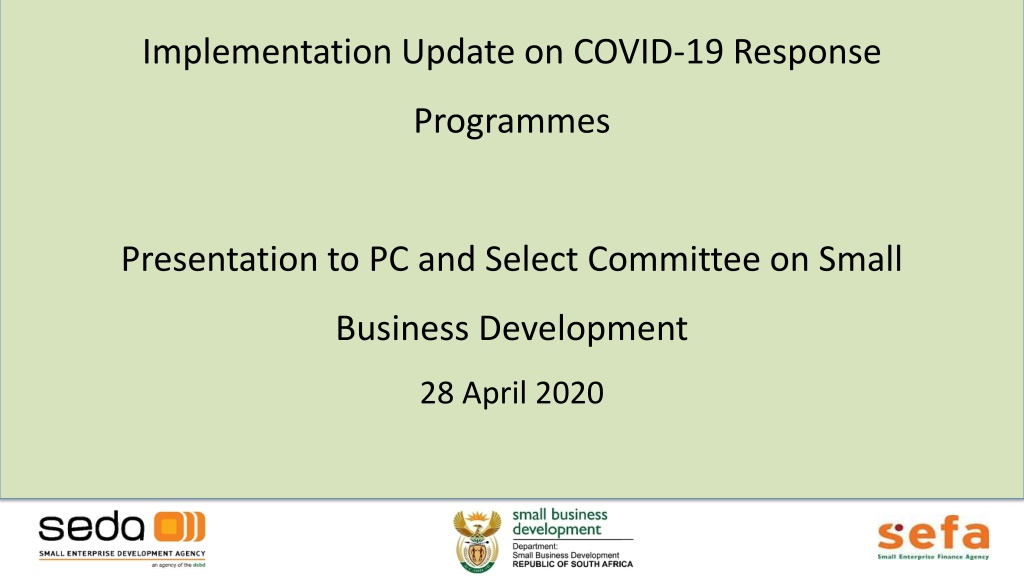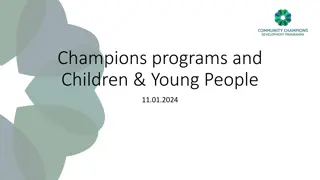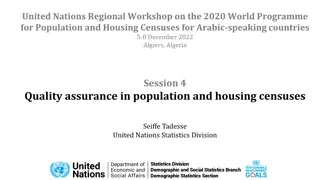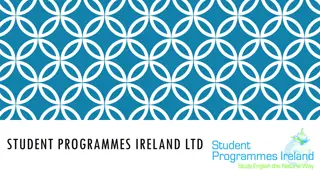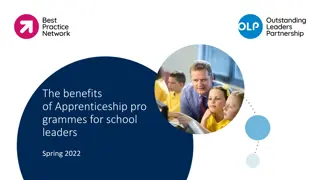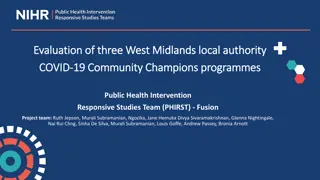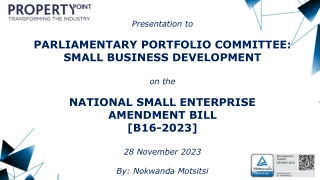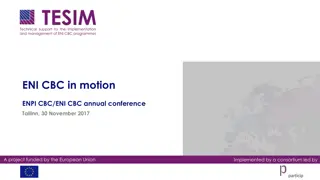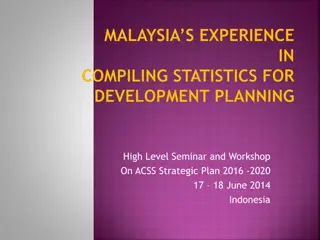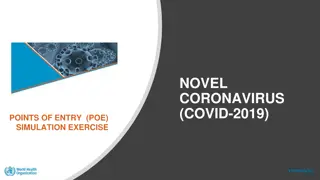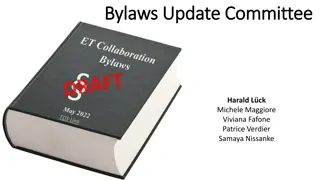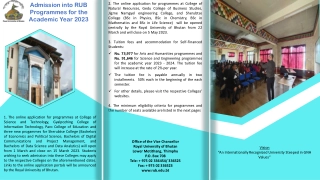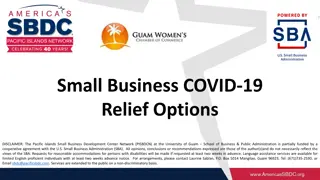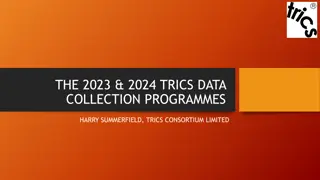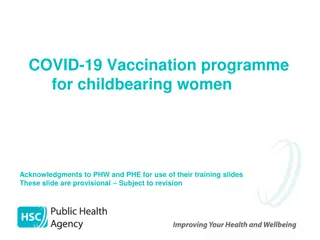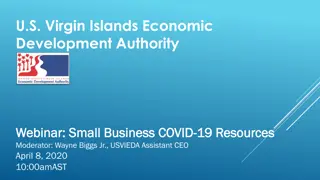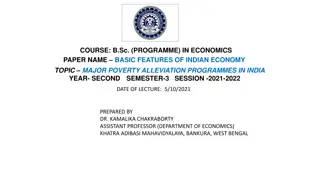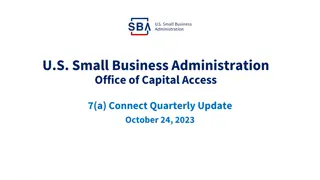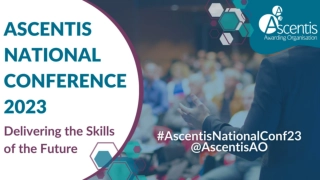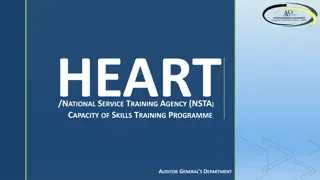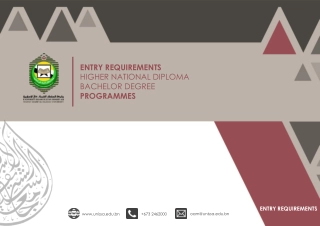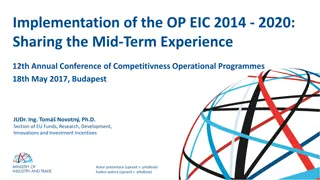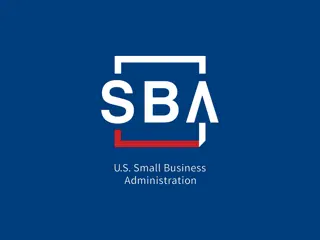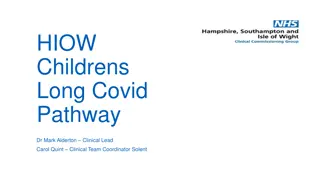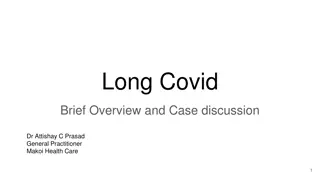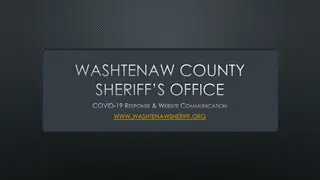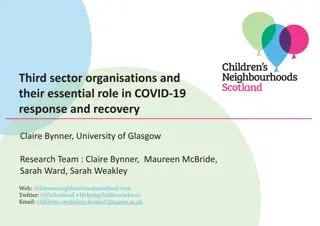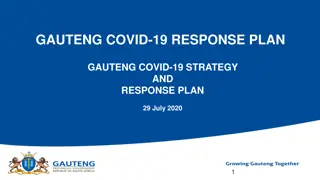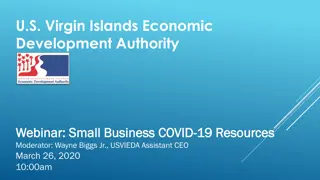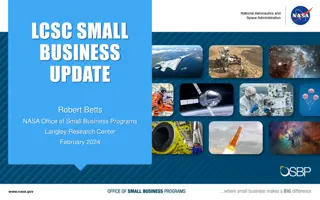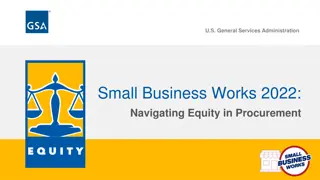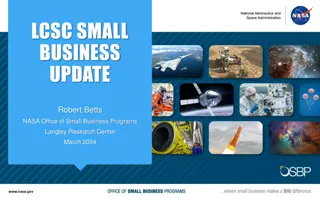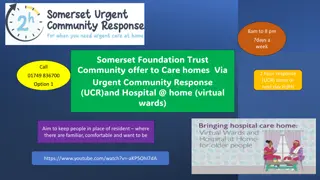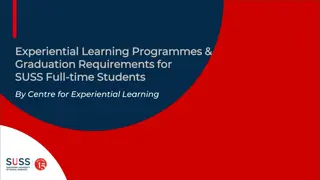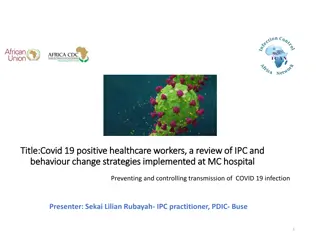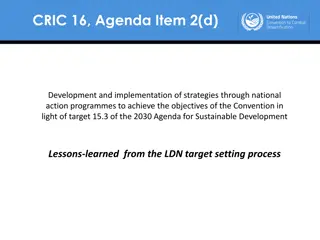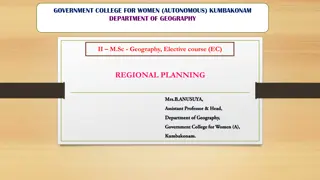Update on COVID-19 Response Programmes Presentation to PC and Select Committee on Small Business Development
The presentation covers interventions designed to aid SMMEs during the COVID-19 lockdown, including the SMME Debt Relief Fund, Business Growth/Resilience Fund, Spaza Shops Support Programme, and more. It outlines the background, purpose, and elements of support provided, emphasizing the importance of keeping businesses afloat and protecting jobs. Post-lockdown interventions are also discussed to help businesses adapt to a new operating environment.
Download Presentation

Please find below an Image/Link to download the presentation.
The content on the website is provided AS IS for your information and personal use only. It may not be sold, licensed, or shared on other websites without obtaining consent from the author. Download presentation by click this link. If you encounter any issues during the download, it is possible that the publisher has removed the file from their server.
E N D
Presentation Transcript
Implementation Update on COVID-19 Response Programmes Presentation to PC and Select Committee on Small Business Development 28 April 2020
Outline 1. Background 2. SMME Debt Relief Fund 3. Business Growth/Resilience Fund 4. Spaza Shops Support Programme 5. Payment holiday for sefa funded clients 6. Other Informal/micro business support programmes 7. Implementation status on SMME Relief/Growth Fund 8. Progress to date on Spaza Shops and General Dealer Support Programme 2
1. Background a) Since the declaration of COVID-19 as a national disaster and subsequent lock- down, the department together with its entities quickly moved to design interventions that are responsive to the challenges faced by SMMEs b) The main purpose of these interventions is too keep businesses afloat during the lockdown as they are not generating any income to sustain themselves and protect jobs c) These interventions differ between those designed for small businesses as well as those designed for informal businesses d) It is also an opportunity to introduce customized interventions for township and rural areas based businesses especially those in the informal sector e) The department is already working on post-lockdown interventions to ensure that businesses are assisted to upgrade their business processes and get appropriate financial support to operate in a different operating environment that we will see going forward 3
2. SMME Debt Relief Fund a) Rationale for facility: To ensure that SMMEs do not close down completely and that they are supported with working capital to ensure that jobs are retained in the economy. Applicable to companies that were in business on 29 February 2020. The elements of working capital covered through the Scheme: i. Payroll assistance - assists employers who s employees do not qualify for UIF Relief, on condition that those employers register their employees with UIF/ or made arrangements with UIF to fulfil their outstanding obligations. Payment is directly to employees bank accounts but applications are done by employers; ii. Rental assistance (facility or equipment) assists businesses to pay their rental obligations for either working tools and facilities/ business premises. In case, facilities rentals there is potential for landlords to double dip from banks rescheduling of mortgage repayments whilst collecting rent from their tenants; iii. Utilities to assist with municipal bills for 3 months, this also alleviates pressure from municipalities who are facing severe financial constrains and yet they must continue to deliver basic services. All SMMEs qualify to apply on the set criteria except for businesses in the informal sector as dedicated programme is designed for the sector b) c) 4
2.1 SMME Debt Relief Fund Target Market SMMEs that are negatively impacted, directly or indirectly by the COVID-19 pandemic Registered business before 29th Feb 2020; Company must be 100% owned by South African Citizens; Employees must be 70% South Africans; Be registered and compliant with SARS & FICA; Registration on the National SMME Database: https://smmesa.gov.za/ Relevant Industry Certification where applicable; Eligibility Criteria Application requirements Register on the www.smmesa.gov.za portal ID Copies of Directors/members; 3 months Bank Statements; 6 months Cash Flow Projections where applicable; Proof of funding required e.g. payroll, lease agreement, utility bill etc. Business Profile; Funding Terms a. The facility offers working capital only strictly direct costs which should be auditable; b. Maximum R500k per SMME will be considered depending on requirements; c. The term of the funding will be determined by the business cash flow with a maximum of 6 months moratorium; d. Loan facilities will be at an interest rate of Prime less 5%. It must be emphasized that the business needs will be assessed to ensure that the fund is not used for what is not intended for; Budget Current Facility: R200mil 5
3. Business Growth/Resilience Facility a) Rationale for the facility: The funding will give local manufacturers and suppliers an opportunity to produce and strengthen their place in the market, which may lead to long term contracts post the COVID-19 pandemic b) This facility will fund the following: i. Production/supply of health care and related products that will be utilized to combat the spread of COVID-19 pandemic. Local production/manufacturing/supply of various products that will be required by the country emanating from a shortage due to COVID-19 pandemic. Only businesses that responded to the Request for Information on suppliers issued by the Department. ii. iii. 6
3.1 Business Growth / Resilience Facility Target Market SMMEs producing products and services that help combat the COVID-19 pandemic Registered business before 29th Feb 2020; Company must be 100% owned by South African Citizens; Employees must be 70% South Africans; Be registered and compliant with SARS & FICA; Registration on the National SMME Database: https://smmesa.gov.za/ Relevant Industry Certification where applicable; Eligibility Criteria ON HOLD Application Requirements Register on the www.smmesa.gov.za portal ID Copies of Directors/members; 3 months Bank Statements; 6 months Cash Flow Projections where applicable; Latest Annual Financial Statements or Management Accounts not older than three months from date of application; Business Profile; Funding Terms a) The facility will offer working capital (only direct costs), stock, bridging finance, purchase order and capital equipment finance; b) The type of facility as well as the amount required will be based on the funding needs of the business; c) The term of the funding will be determined by the business cash flow and debt sculpting techniques will be utilized; d) Loan facilities will be provided at an interest rate of Prime less 5% pa. The business needs will be assessed to ensure that the fund is exclusively used for the finance stated in (a), Budget Current Facility: R300mil 7
4. Spaza Shops and General Dealer Support Programme a) Support opportunities for self-employment and job-creation at economic entry level whilst improving the circulation of money within townships and rural areas; Create opportunities for some informal businesses to be intermediary step to formal economy and get as many people as possible into the tax net Realize potential for spazas, general dealers, small hardware stores and spares shops, sole proprietors and artisanry businesses to serve as centres for locally manufactured goods and services, Strengthen informal businesses as local convenient and service centres for access to basic goods and services; Facilitate dedicated support programmes to make informal businesses profitable, successful and recognized in the formal economy; KEY ASSUMPTIONS i. The informal business owners will benefit through the envisaged social relief grant in the short term; ii. The informal businesses are part of essential services or part of the businesses to re-open first; iii. Support is granted to licensed businesses in line with the Business Act of 1991 as amended iv. The sector specific approach improves line of sight and impact assessment of the initiatives v. The support is a combination of working capital investment and access to revolving credit backed by the Khula Credit Guarantee Scheme across different initiatives; b) c) d) e) 8
4.1 Spaza Shop and General Delear Support Programme Target Market SMMEs running Spaza Shops and General Dealers Eligibility Criteria The spaza Shop / General Dealer must be owner-managed and operated Owner must have a valid South African identification document. Must register on SMMESA portal https://smmesa.gov.za/ Spaza shop / General Dealer must hold license to trade, municipal permit or if they do not have, they must obtain one before they can access support. CIPC, SARS and UIF registration OR Be willing to register before approval of support Undertaking to comply with the Consumer and Customer Protection and National Disaster Management Regulations and Directions Willing to submit monthly management accounts (Seda to assist with bookkeeping support) Application requirements Register on the www.smmesa.gov.za portal ID Copy Valid municipal permit / licence to trade Funding Terms a. Networking or purchasing power (bulk buying): Coordinate and support bulk buying on a pre-approved basket of goods and distribution through participating wholesalers b. Access to working capital injection and credit Maximum R3 500 working capital investment through a bulk buying facility with selected wholesalers on pre-selected basket of goods Additional R3 500 credit facility; or A full R7 000 credit facility Budget Current Facility: R175mil to reach 25 000 Spazas. 9
4.2 Participating Wholesalers to Support Spaza Shops Wholesalers / Affiliates / Branches 80 76 70 60 50 39 40 30 20 13 12 11 11 10 6 6 1 0 Eastern Cape Free State Gauteng KwaZulu Natal Limpopo Mpumalanga North West Northern Cape Western Cape To date there are 9 wholesalers who have signed up for the programmes with affiliates and branches throughout the country. The programme will remain open to wholesalers to join the scheme, on condition they agree to the terms & conditions of the programme. 10
5. Payment Holiday for sefa funded Clients Given the prevailing economic conditions and the pronouncements by the Minister of the Department Small Business Development (DSBD) to assist the small business sector, sefa is offering various relief programs to SMMEs including sefa funded clients. One of the interventions is the restructuring of loans of sefa funded clients. The restructuring of loans on sefa funded clients comprise of 2 interventions as follows: 1. Providing payment holiday/postponement of instalments of up to six months to sefa clients. The payment holiday is on both capital and interest. Debt restructuring (review of funding period, interest and funding instruments) and provision of additional funding to clients who are seeking relief during this period: 2. a. The facilities will vary per funded SMME depending on the entity s cash flow needs; b. The debt repayments will be sculptured to match the pattern of the cash flows; and; c. The additional funding will be offered at prime less 5%. This will ensure that the already funded SMMEs are protected from high interest rates and are offered an opportunity to survive post the COVID 19 pandemic. There are 219 clients in the Direct Lending (DL) active book who will be eligible for a blanket payment holiday. These clients have total outstanding loan balance of R335m. 11
6. Other customised informal business interventions The following schemes are being finalized and will be launched soon: a) Auto spares, Auto Fitment Centres and Mechanics and Motorbody repairers shops Programme. Grant and revolving credit facility. b) Bakeries and confectioneries support programme. Grant and revolving facility c) Tradesmen and Artisan businesses/ Sole Traders. The scheme also targets packaging their participation in the public infrastructure programme. d) Informal Clothing and Textile businesses targets to support sewists whilst also creating opportunities for access to markets with option to organize them through secondary cooperatives e) Hairdressers, beauticians and wellness spas - like spaza shops hairdressers etc can become an effective channel to market for beauty and personal care products that are manufactured by local businesses. f) General hawkers and street vendors g) Professional business services h) Small scale manufacturing 12
7. Implementation Status on Growth Fund /SMME Debt Relief Application Stage SMME Debt Relief Fund (no. of SMMEs) Business Growth /Resilience Facility Application Enquiries 16 988 Basic Assessment 2 445 Due Diligence 120 ON HOLD Approval Committee 100 Total 2 665 Approval Outcomes SMME Debt Relief Fund Business Growth /Resilience Facility No. of SMMEs 665 4 Jobs created / maintained 10 986 159 Amount approved R235 809 911 R16 786 659 Total SMME approved: 669 Total Jobs created / maintained: 11 145 Amount approved: R252 596 571 Total SMMEs referred to Seda for pre-loan support: 4 615 13
7.1 Implementation Status as at 24th April 2020(cont) Provincial Spread Amounts Approved R84,665,940 R90,000,000 R80,000,000 R70,000,000 R60,000,000 R50,420,604 R50,000,000 R35,440,808 R40,000,000 R24,361,981 R30,000,000 R16,891,091 R16,418,896 R20,000,000 R11,880,377 R7,116,935 R5,399,941 R10,000,000 R0 Gauteng Kwa-Zulu Natal Western Cape Eastern Cape Limpopo Mpumalanga North West Northern Cape Free State 14
7.2 Implementation Status as at 24th April 2020(cont) Number of SMMEs Approved 250 214 200 150 124 99 100 60 49 45 50 35 25 18 0 Gauteng Kwa-Zulu Natal Western Cape Eastern Cape Limpopo Mpumalanga North West Northern Cape Free State 15
8. Progress on Approvals on Spaza Shops Support Programme Number of Spazas Approved 70 60 60 50 40 30 20 8 10 7 5 3 2 2 1 0 0 Kwa-Zulu Natal Gauteng Limpopo North West Eastern Cape Western Cape Northern Cape Free State Mpumalanga sefa received 104 applications on the 22nd April 2020 and 88 of them were approved. The 16 that were declined were businesses such as hawkers, electricians, chisanyama, & none permit holders. 16
Rationale for Co-operatives Development Unit THANK YOU.
